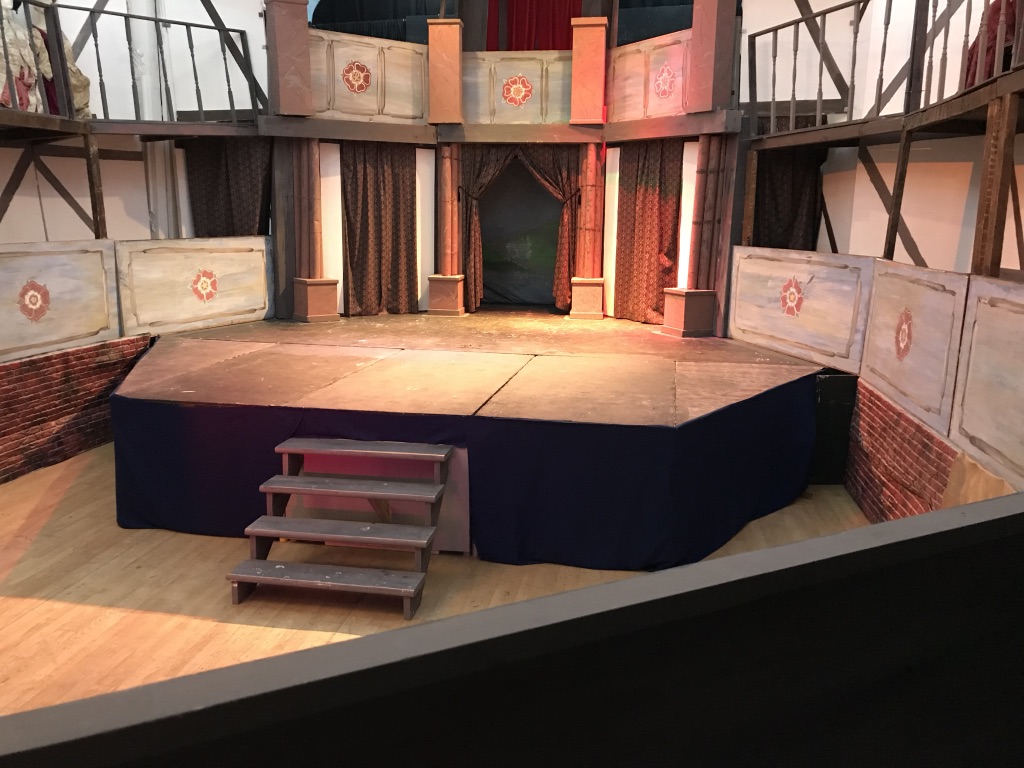by Richard Stride
Located in in Portsea, Hampshire, The Groundlings Theatre was originally an old schoolhouse but after I bought this burnt-out wreck with no services, floors missing in places and so many holes that it was holier than the Vatican, I discovered the rich history of what was actually a Lost Georgian Theatre from 1784. Queen Victoria watched Strauss play there, Charles Dickens was nearly born there and Australia’s first Prime Minister even went to school there.
I have been running The Groundlings for about 20 years. On 20th June 2020 we had our birthday celebrating the first performance we did way back in 2000, which was Twelfth Night.
I had to look at operating this theatre perhaps very differently to many other theatres. Usually about 40% of a theatre’s income will be through ticket sales; most will then find the remaining 60% through grants and subsidiaries and things like that. When we took over the building, it was a burnt-out wreck, which we restored and refurbished, so we didn’t have the option to apply for lots of funding. There were no grants available so we had to find the remaining 60% through other means, including holding weddings, sending our shows out to other venues, wardrobe hire, party hire, bar mitzvahs – everything you could possibly imagine!

I also created a more social environment by having round tables in cabaret style, this meant that people chatted to one another and then quickly became our marketeers telling each other about the venue. Ticket sales rocketed!! We also went into schools and did events, so we found all the additional funding through other operations to support the main theatre. I had to be incredibly careful with money, so I would plan the entire year of shows and design sets that could be adapted to create new ones, so my production costs tumbled. It’s a logistical nightmare but certainly possible, and the audience never knew that the set made for Frankenstein also did for Christmas Carol and Cinderella.
We had volunteers that came from far and wide, even including a chap who lives in London so for one of his weeks of holiday a year, he’d come and volunteer and we’d see him again the following year. These volunteers learnt valued skills that they then went on to use in the creative industries or other areas.
The venue has a rich history and we wanted to tell that story. Downstairs was a school but then upstairs was a theatre – a weird combination! The reason for this is that the building is inside the city walls and it was actually against the law to have a theatre inside the city walls in 1784 when it was built. Instead of calling it a theatre, the term, hall was used so it was originally named the Beneficial Society Hall of Southsea Common because the area was then called Southsea Common, not Portsea. To get around the authorities, they used to do sneaky things like putting a school house underneath a theatre. Putting on a straight play wasn’t allowed, so they would put music to it, which became known as music hall, and led to the birth of the musical.
There are no other existing theatres in the United Kingdom that date from before the ban was lifted in 1788, so this is the only one of its kind. That’s why it’s unique. It was pretty much a lost theatre, having closed in about 1860 to 1880 – although there’s no record for exactly when and no one in living memory that would have known it was a theatre hall.


As part of our work at The Groundlings, we created a drama school to train actors, set designers, costume makers, stage crew and directors etc., with kids and adults travelling from all over to attend. The school became a real centre for training in all aspects of the arts and I think that’s why we’ve been consistently named one of the top drama schools in the UK. We also provide a lot of opportunities to go on and do amazing things after their training – that’s been really important.
I also wanted to take learning into the community, and creating a Theatre in Education arm for the company seemed a great way to do this. There’s a lot of evidence that if you put live theatre in front of anyone, it has an emotional content to it, it resonates much more than being given information in other ways. Theatre can make a story feel more real, so when we get drawings and pictures from children who’ve seen a play, it’s amazing how accurate they are, because they’ve remembered it.
I remember sitting in a tube train in London once and a young 14–15 year-old lad sat with his parents opposite me suddenly started doing this clap routine which we did in The Victorians. I just looked at him and he said, ‘You’re that guy that was in The Victorians’ and of course he’d watched that, probably when he was 7 years old, but he still remembered the routine because it had stuck in his mind. He said, ‘I always loved that day, that was really good. You came and did a workshop and a show. I remember everything about The Victorians’.
Funnily enough, the complaint we often get from teachers is, ‘Thank you very much for coming, the only thing is I have nothing left to teach!’ because the children remember everything from that day. I always say to them to start using that as a seed and learn more about that period even if it’s not on the national curriculum – just delve in because there’s loads more interesting stuff.
Using songs and plays makes such a big difference and it does stick in people’s minds.
If you make a song up about the six wives of Henry VIII, it’s very easy to remember. Quite often when people ask me, I’m singing the song in my head to get to the right one, it’s like the rhyme: ‘divorced, beheaded, died, divorced beheaded, survived’. A lot of people remember that because it’s got resonance to it, it’s got alliteration and all those little things. We like patterns and we remember things of high emotion. If I asked you what you were wearing seven days ago, you probably wouldn’t have a clue, but if I asked you what you were wearing on 11th September 2001 (9/11), you would probably be able to say. It’s because it carried high emotion and that’s what sticks in our minds. Theatre is about high emotion.

For the future I have now turned the theatre into a trust who are now running it. I really wanted to start to spread my wings and get out and work with so many other brilliant creatives out there. So I now mainly work as an actor / director / set designer. It’s been really successful so far with some wonderful opportunities, meeting so many new people. I adore this lifestyle and thrive on being creative with others. Long may it continue.
Richard Stride
Owner of Groundlings Theatre,
Artistic Director from 2000 – 2020.


